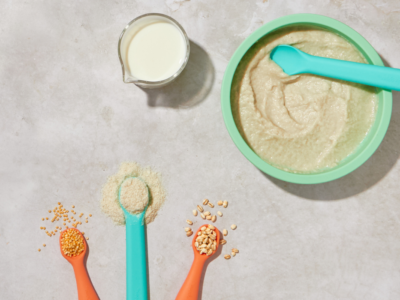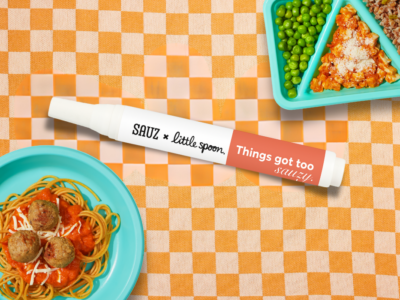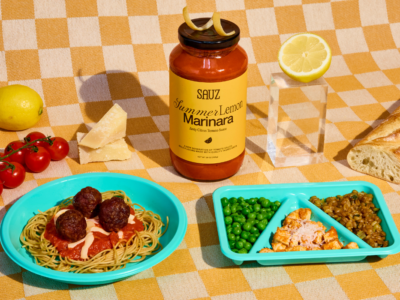The most common question I get from new parents is about their baby’s protein needs. Most are worried that their little ones aren’t getting enough. The good news is that babies don’t need a lot of protein and an actual protein deficiency is rare. Kids ages 1-3 yrs old need roughly 13 to 16 grams of protein a day and odds are your little one is getting that. In fact, according to a recent study, all age groups met or exceeded the minimum recommendations for protein intake. However I’ve put together a bunch of easy, actional info and tips to take the stress out of ensuring your little one is getting all the protein they need. That being said, you should always reach out to your pediatrician or a registered pediatric dietitian if you are concerned.
Let’s dive a bit deeper into WHY protein is important, WHAT are some yummy healthy foods that contain protein (animal and plant-based) and HOW to incorporate them in your little one’s diet.
Why is protein important?
Proteins are essential to basically everything we do, all the way down to the cellular level. For babies, protein is super important as it helps develop their muscles, tissues, brain and immune system. Just as important, and perhaps most important for parents, protein regulates blood sugar, keeping things stable throughout the day. We’ve all experienced a baby or kid with low blood sugar, and as parents we will go to any length to prevent it! Protein gets digested more slowly than carbohydrates, so it essentially works to steady the blood sugar response after a meal PLUS it helps to keep little one’s feeling full longer.
While the body can create its own natural protein, we need to get the majority of it from our diet. The amino acids that make up proteins can be divided into two categories:
- Essential amino acids are not made by the body and must be provided by the diet
- Non-essential amino acids can be made in the body
Is your little getting enough protein intake?
Aim to include a protein source with every meal and with at least one snack. That way you’re making sure your little one is all fueled up, but also checking that their energy levels (and mood) will be a bit more consistent throughout the day. We do want to focus on quality proteins that also provide our little one’s with an assortment of nutrition to help them thrive. Examples include animal proteins like grass-fed beef (which is also rich in iron, zinc, selenium, B vitamins, and Omega 3 fatty acids), free- range pasture raised chicken and eggs and fish. Even though animal proteins provide many of the essential amino acids needed for growth and development, a balanced plant-based diet can also provide quality protein including legumes/beans, peas, edamame/tofu, full fat yogurt (preferably unsweetened) as well as nuts and seeds. Giving your child a mix of proteins can minimize picky eating! Even if yogurt is a main source of protein for your little one, try to not get so stuck on just one brand or one topping. Exposure and variety are key.
If your little one skips a protein at a meal or in a day, that is normal! When it comes to how much or serving sizes, let the kids lead. They are great at naturally self-regulating and as I’m sure you have realized, eat more at some meals than others. I recommend looking at their nutrient intake over the course of a week or two versus a single day.
What are some yummy, healthy + protein packed foods for babies?
Below is a chart of some great protein sources for kids to give you a sense of how much protein is in certain foods:
1 egg= 6g of protein
1 ounce of chicken/beef/fish= 7 grams of protein
1 oz/slice cheese= 7g
4 oz cow or goat milk= 4g
1/2 cup chickpeas= 7g
½ cup edamame= 8g
1/2 cup yogurt = 12g
1.5 tbsp hemp seeds/hearts= 4.5g
¼ cup tofu= 7g
1 tbsp pb= 4 g
2 tbsp hummus= 2.5g
½ cup cooked quinoa= 6g
1.5 tbsp chia seeds= 2.5g
¼ cup of oats= 3.5 g
1 slice sourdough bread = 4 g
Instead of worrying about how many grams of protein your little one is getting, focus on protein rich foods that your baby will love! Here are a few meal and snack ideas:
Breakfast:
- Full fat yogurt + sprinkle of hemp hearts + fruit
- Little Spoon Tahini Banana Bread Smoothie
- Little Spoon Purple Carrot Blueberry Oatballs
- Chia pudding
- Scrambled eggs + toast
Lunch:
- Egg salad + sliced cucumber + carrots
- Green smoothies
- Grilled nut butter and pear sandwiches
- Rice + beans + hummus + sliced pepper
- Little Spoon Chicken Potstickers
- Little Spoon Mac and Three Cheese
- Cheese quesadilla
Snacks:
- Little Spoon Smoothies
- Mango yogurt ice pop
- Little Spoon Purple Carrot Blueberry Oatballs
- Carrot cake muffin tops
- Hummus + veggies or crackers
- Piece of cheese + fresh fruit
- Chia pudding
Dinner:
- Chicken/noodle veggie soup
- Maple/Soy Salmon
- Little Spoon Tortellini + Pesto
- Little Spoon Chicken Super Nuggets
Most importantly don’t worry! Mealtime can be stressful and Little Spoon makes it as fun as possible!


